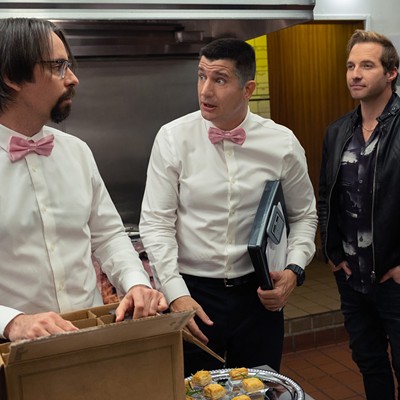Wednesday, September 22, 2010
Saving 'Chuck'
Let's be clear. By now, it's pretty much impossible to save Chuck in the sense of winning it another season. It's on its second second chance, and still floundering in the ratings. The critical community that once banded together to save Chuck for another season has moved on to champion other shows.
But I have a soft spot for Chuck. It was the first show I reviewed at the Inlander. Its improvement from the first to second season excited me in the way it was beginning to find its potential.
Then it plateaued. It grew stagnant. It turned into that guy from your sociology class. You know, the one who never studies for the test, but is charming enough to smile his way to a B-? The ambition isn't there. The quality of Chuck hasn't seen the massive collapse in the way that season six of 24 did. Instead, it's losing steam with a slow deflating hissssss.
All the more reason why Chuck needs to rediscover its passion in its (almost assuredly) final season.
Here's how it can do that:
1) Pound in the stakes: Joshua Schwartz, wunderkind creator of The O.C. and Gossip Girl, specializes in teen shows. As a result, Chuck has dealt with largely teen and twenty-something issues: unrequited love, becoming an adult, and dealing with a dead-end career. Not bad stakes for Gossip Girl. But when your hero is a tech geek-turned-superspy, those aren't adequate. The stakes need to be higher. The entire world should be in peril, and we should feel that peril. You want to make it personal? Kidnap Chuck's sister. Have her stay kidnapped for several episodes. Kill a valuable cast member. And do it in a way, bereft of silly jokes or indie montages, that ensures we actually feel the punch. Angst is fine. But there's action-comedy angst and there's teen-drama angst, and Schwartz keeps heaping on the latter.
2) Give us a bad guy. No, not just a bad guy of the week easily thwarted by our lovable heroes' wacky hijinks and technical skills. Not an organization that we hear is totally ruthless but has their plans thwarted each and every time, like a Saturday morning cartoon villain. We're talking about a villain who lasts until the very less episode of the season, and who instantly makes an impact. Blow up half of Burbank, Calif., if you have to. That gives us instant, enjoyably pulpy conflict, instead of having the main conflict between the protagonist and the protagonists' sense of self-worth.
3) Make the central romance incidental, instead of pivotal. Chuck and Sarah have fantastic chemistry in their scenes together. The problem is that, oddly, they don't seem to have that chemistry with each other. They're each putting in fantastic individuals portrayals of people in love — but it doesn't feel like either character is truly connecting. This is not the fault of the actors. Perhaps it's just odd to see an archetype with Sarah with an archetype like Chuck. But whatever the reason, the romance has always been one of the weakest points of the show. You can't completely remove it — the squealing fanbase that cares about those sort of things would shriek — but you can focus on the stronger character relationships in the show. Like Chuck's relationship with his sister or the gruff special agent Casey. ---
4) The spy missions need to be a little more clever. Lately, Chuck seems to oscillate between two types of spy missions: Chuck has some task to complete during a fancy banquet, or Chuck has to break into a facility. If writers have to watch reruns of Alias or Mission: Impossible to get a little more creativity, it would certainly help. Chuck is constrained by a low, low budget, but that makes variation and creativity all the more important. You can't cover up staleness with elaborate sets or action sequences anymore.
5) Go crazy. Some shows chisel their plot twists in stone. Chuck uses a dry erase marker. When you blow up a building in the season finale, and then have it completely rebuilt in the season premiere, you're holding on the status quo with a white-knuckled grip. For so many story elements, Chuck is a treadmill — there to give an illusion of movement, but making very little progress. It's not as bad as, say, Burn Notice, which seems downright claustrophobic in its refusal to let the formula change. But if Chuck wants to create a memorable season, they need to dare go in wild directions.
Sure, taking these sorts of risks means that Chuck could end up "jumping the shark." But that's better than floating with water wings in the shallow end, never daring to put on skis.
Tags: tv , television


















